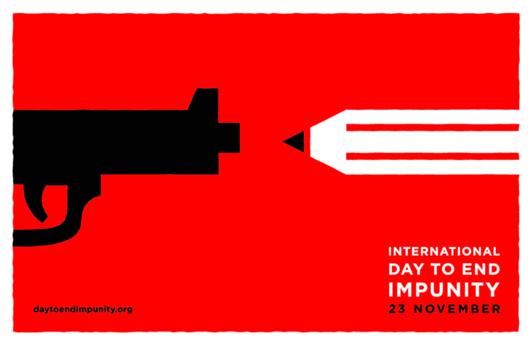November 23rd marks the International Day to End Impunity, a call to demand justice for the many journalists around the world who have been killed for exercising their right to freedom of expression and whose perpetrators are exempted from punishment and penalty. I've been working with a media monitoring NGO called the Center for Media Freedom and Responsibility (CMFR), an organization that has been actively involved in organizing events and raising awareness of the growing culture of impunity within the Philippines.

To give you some background, let me tell you that the media have been a cornerstone in the nation’s struggle for independence, democratization and justice. And until recently, the Philippines has been heralded as having the freest press in Asia, with a rich history of a thriving and rambunctious press system that can be traced back to its revolutionary movement against the Spaniards. At the end of the 19th century, La Solidaridad, a newspaper published in Spain by leading Filipino intellectuals, served as an instrument of expression for the revolutionary sentiment against the Spanish and the Filipino cause for change and independence. Similar to its role in inciting revolutionary sentiments at the end of the 19th century, the Philippine press was also crucial in the People Power Revolution of 1986 that ultimately toppled the Marcos regime. And after being silenced for years under a dictatorial government, the media flourished...
The right to the freedom of expression, of speech, and of the press has always been enshrined in the Philippine constitution. Despite this, however, the press, at least in its current state, is an incredibly weak institution that faces intractable challenges, none more so than the culture of impunity. Unpunished violence against the media has soared since the years after the Marcos regime fell, especially during the years of the Arroyo administration. As journalist Lin Neumann once wrote for the Committee to Protect Journalists, the "damage done by Marcos' martial law remains. By dismantling the structure of the press built up over previous decades, Marcos weakened the professionalism and ultimately politicized the media to a staggering degree", creating a climate of fear that continues to be a powerful force in the Philippine press.
Defined by CMFR's Deputy Director Luis Teodoro as “the way some societies ignore, permit or even encourage various forms of violence against journalists as well as their harassment and intimidation, and allow these to go unpunished”, the culture of impunity has truly dominated the Philippines in recent years. From being praised as having the freest press in Asia, the Philippines’ reputation has suffered, becoming the second most dangerous place in the world for media workers, only behind Iraq. Since 1986, 123 journalists and media workers have been killed in the line of duty and only 10 convictions have been carried out for these killings.
This near zero arrest, trial, and conviction of killers is fueling the culture of impunity that is stifling the freedom of expression, of speech, and of the press in the Philippines. It is no surprise then that its position on RSF's Press Freedom Index of 2010 dropped precipitously to 156th place out of the 178 countries included in the ranking, officially joining the ranks of infamously repressive states such as China, Iran, Burma, and North Korea. This culture of impunity not only threatens the lives of its media workers but also impinges on every Filipino’s right to freedom of expression.
The change in administration to Noynoy Aquino, the son of revolutionary icons Benigno and Corazon Aquino, reignited hope...but after more than a year in office, the killings continue. Six journalists have been killed under his administration and the lack of strong action and major shift in policy to end impunity leaves the country wanting in justice...
The road is long and no single government agency or NGO can act alone to definitely end what has become, if I may again borrow from our hero Rizal, a cancer of this society. But let this first Day to End Impunity be the beginning of a real and effective treatment against this deadly disease...
To learn more about the Day to End Impunity, visit www.daytoendimpunity.org.
To learn more about impunity in the Filipino context, visit www.cmfr-phil.org.
